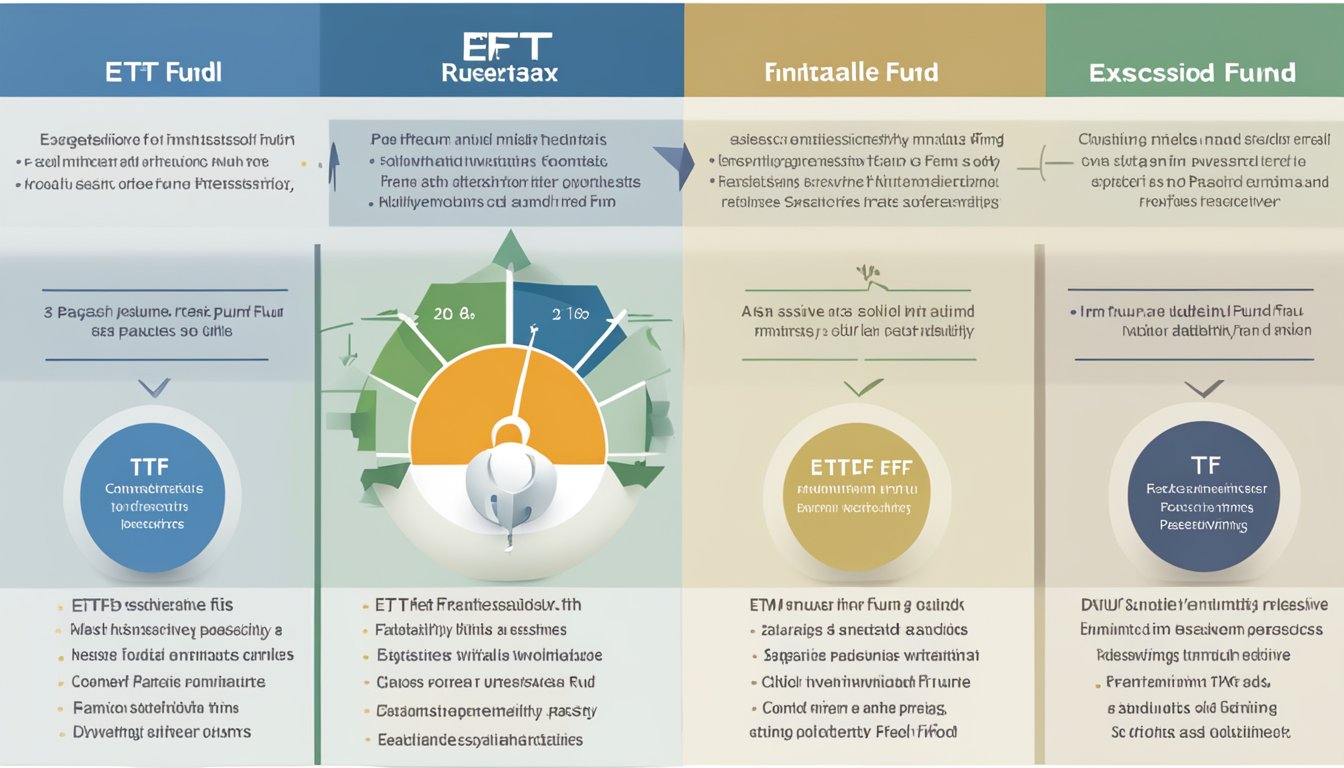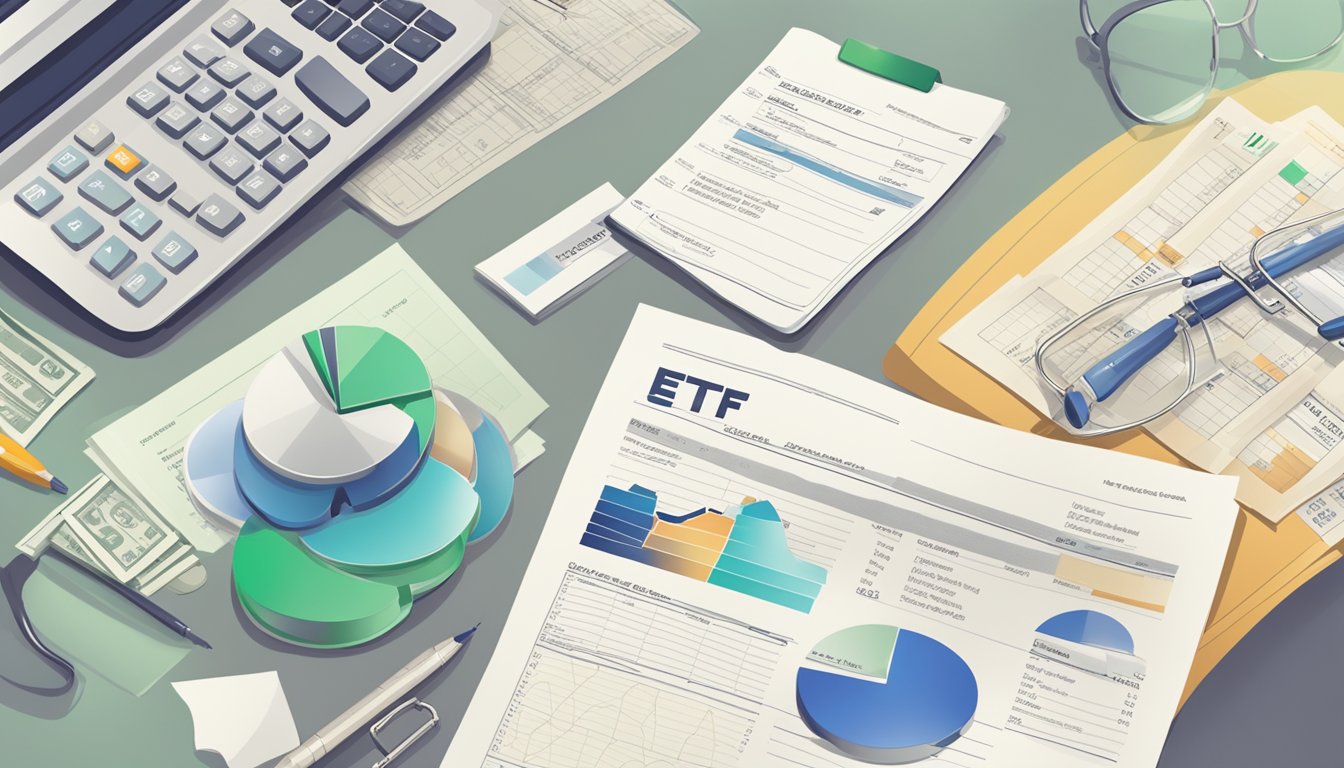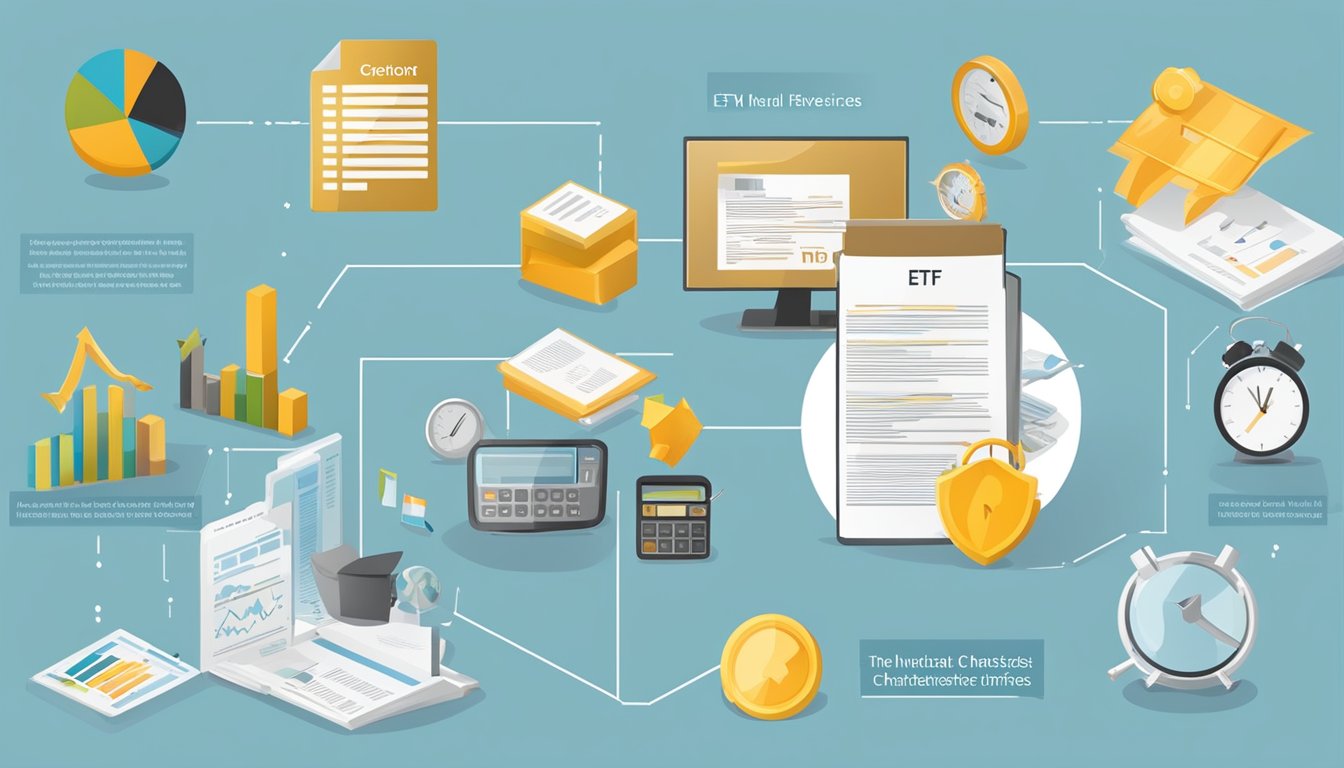Are you confused about the difference between ETFs, mutual funds, and index funds? You’re not alone. These investment options have some similarities, but there are also some key differences you should be aware of. In this article, we’ll break down the basics of each option and help you understand which one might be right for you.

First up, let’s talk about ETFs. ETFs, or exchange-traded funds, are a type of investment fund that trades on a stock exchange. ETFs are designed to track the performance of a specific index, such as the S&P 500. Because ETFs are traded like stocks, you can buy and sell them throughout the day at market prices. This makes them a more flexible option than some other types of funds. ETFs also tend to have lower fees than mutual funds, which can make them an attractive option for investors looking to keep costs down.
1 Min Read
Can’t decide between ETFs, mutual funds, and index funds? Don’t worry, this quick guide simplifies the key differences to help you pick the right fit.
Here’s the gist:
- All three: Pool your money with others to invest in a basket of assets (stocks, bonds, etc.) for diversification and potentially higher returns.
Key Differences:
- Want flexibility and potentially lower fees? Consider ETFs (Exchange-Traded Funds). They trade like stocks throughout the day and often have lower expense ratios than mutual funds.
- Prefer professional management? Mutual funds might be your pick. Fund managers actively choose investments, but this often comes with higher fees.
- Looking for low costs and diversification? Index funds could be your answer. They passively track a market index, offering a broad range of investments with typically lower fees.
Choosing the right one? It depends on your goals. ETFs offer flexibility and potentially lower fees, while actively managed mutual funds might suit those seeking professional guidance. Index funds combine low fees with broad market exposure.
Understanding Investment Vehicles

Investment vehicles are financial products that allow you to invest your money in a diversified portfolio of assets. They come in different types, each with its own unique characteristics, benefits, and drawbacks. In this section, we will explore three popular investment vehicles: ETFs, mutual funds, and index funds.
What Are ETFs?
ETFs, or Exchange-Traded Funds, are investment vehicles that track a specific index, sector, or commodity. ETFs are traded on stock exchanges, just like stocks, and can be bought and sold throughout the trading day. ETFs are a popular investment choice because they offer diversification, low costs, and flexibility. ETFs also offer tax efficiency because of their structure, which allows them to avoid capital gains tax.
Exploring Mutual Funds
Mutual funds are investment vehicles that pool money from multiple investors to invest in a diversified portfolio of assets. Mutual funds are actively managed by professional fund managers, who make investment decisions on behalf of the investors. Mutual funds offer diversification, professional management, and ease of use. However, mutual funds have higher costs than ETFs and are less tax-efficient because of their structure.
Demystifying Index Funds
Index funds are investment vehicles that track a specific market index, such as the S&P 500. Index funds are passively managed, which means they do not require active management by a professional fund manager. Index funds offer low costs, diversification, and tax efficiency. However, index funds do not offer the same level of flexibility as ETFs, and their returns are limited to the performance of the index they track.
Operational Structures

When it comes to operational structures, there are some key differences between ETFs, mutual funds, and index funds. In this section, we will explore these differences in detail.
ETF Structure
ETFs are structured differently from mutual funds and index funds. ETFs are traded on stock exchanges, which means that they can be bought and sold throughout the trading day, just like individual stocks. This makes them highly liquid and provides investors with the ability to trade them at any time during market hours.
ETFs are also passively managed, which means that they track an index and do not require a fund manager to make investment decisions. As a result, ETFs tend to have lower expense ratios than actively managed mutual funds.
Mutual Fund Mechanics
Mutual funds, on the other hand, are not traded on stock exchanges. Instead, they are bought and sold directly with the fund provider at the end of the trading day at the net asset value (NAV) price. NAV is the total value of the fund’s assets minus any liabilities, divided by the number of shares outstanding.
Mutual funds are actively managed, which means that a fund manager makes investment decisions on behalf of the fund. This can result in higher expense ratios than passively managed ETFs.
Index Fund Operations
Index funds are similar to ETFs in that they are passively managed and track an index. However, they are bought and sold directly with the fund provider at the end of the trading day, just like mutual funds.
Index funds tend to have lower expense ratios than actively managed mutual funds, but higher than ETFs. This is because they are not traded on stock exchanges and therefore do not have the same trading costs as ETFs.
Investment Strategies

When it comes to investing in funds, there are two main strategies: passive and active management. Passive management involves tracking an index, while active management involves attempting to outperform the market. Both strategies have their pros and cons, and it is up to you to decide which one is best for you.
Passive Vs Active Management
Passive management, also known as index investing, involves investing in a fund that tracks a specific index. This means that the fund’s performance will mirror that of the index it is tracking. Passive management is a popular investment strategy because it is low cost and provides broad market exposure. Index funds and ETFs are popular passive investment options.
Active management, on the other hand, involves trying to outperform the market. This strategy involves a fund manager making investment decisions based on their research and analysis. Active management can be more expensive than passive management, but it also has the potential to generate higher returns.
Tracking the Index
Passive investing involves tracking an index, which can be a specific index, such as the S&P 500, or a more broadly diversified index, such as the MSCI World Index. When investing in an index fund or ETF, it is important to understand which index the fund is tracking and how closely it tracks that index.
Diversification Tactics
Diversification is a key element of any investment strategy. Investing in a diversified portfolio can help reduce risk and improve returns. When investing in funds, it is important to understand the fund’s diversification tactics. Some funds may invest in a specific sector or industry, while others may invest in a broad range of assets.
Performance and Returns

As an investor, evaluating the performance of a fund is crucial before investing your hard-earned money. When comparing ETFs, mutual funds, and index funds, it’s important to consider their performance and returns.
Evaluating Fund Performance
One of the key metrics used to evaluate the performance of a fund is its benchmark. A benchmark is a standard index against which the fund’s performance is measured. For example, the S&P 500 and Dow Jones Industrial Average are two of the most commonly used benchmarks in the United States.
When evaluating fund performance, it’s important to compare the fund’s returns to its benchmark over a specific period. If the fund outperforms its benchmark, it’s considered to have delivered alpha, which is a measure of the fund manager’s ability to generate returns above the benchmark.
Returns Comparison
When comparing the returns of ETFs, mutual funds, and index funds, it’s important to consider their expense ratios. ETFs and index funds generally have lower expense ratios than actively managed mutual funds, which can impact their returns over the long term.
According to a SmartAsset article, “over the past decade, the average annual expense ratio for mutual funds was 0.68%, while the average expense ratio for ETFs was just 0.19%.” This means that ETFs and index funds may have a higher chance of generating higher returns over the long term due to their lower expenses.
Exciting News for New Investors!
Did you know you can invest throughout the day with ETFs? Unlike mutual funds, ETFs trade like stocks, offering you more flexibility and potentially lower costs. This can be a game-changer for investors looking to actively manage their portfolios. Explore ETFs today and see if they fit your investment strategy!
Costs and Expenses

When it comes to investing, one of the most important things to consider is the cost. In this section, we will discuss the costs and expenses associated with ETFs, Mutual Funds and Index Funds.
Expense Ratios Unveiled
Expense ratio is the annual fee that is charged by the fund manager to manage the fund. This fee is expressed as a percentage of the total assets under management. ETFs, Mutual Funds and Index Funds all have expense ratios, but the expense ratios of ETFs and Index Funds are usually lower than those of Mutual Funds. According to Investopedia, ETFs and Index Funds can have expense ratios as low as 0.05%, while the expense ratios of Mutual Funds can be as high as 1.00% or more.
Commission and Trading Costs
Another cost to consider when investing in funds is the commission and trading costs. When you buy or sell shares of a fund, you may be charged a commission by your broker or financial advisor. In addition, there may be trading costs associated with buying and selling shares of the fund. ETFs and Index Funds are generally more cost-effective than Mutual Funds when it comes to commission and trading costs. This is because ETFs and Index Funds can be bought and sold like stocks, while Mutual Funds can only be bought and sold at the end of each trading day.
Tax Implications
Tax efficiency is another important factor to consider when investing in funds. ETFs and Index Funds are generally more tax-efficient than Mutual Funds. This is because ETFs and Index Funds are structured in a way that allows investors to avoid paying capital gains tax until they sell their shares. Mutual Funds, on the other hand, are structured in a way that requires investors to pay capital gains tax on any gains that the fund realizes, even if the investor does not sell their shares. According to Fidelity, the structural differences between ETFs and Mutual Funds give ETFs a tax advantage over Mutual Funds.
Investor Considerations

If you’re considering investing in mutual funds, index funds, or ETFs, there are a few things to keep in mind. Here are some important considerations to keep in mind when deciding which investment vehicle is right for you.
Minimum Investment Requirements
One of the most important things to consider when choosing between mutual funds, index funds, and ETFs is the minimum investment requirement. Mutual funds typically require a higher minimum investment than ETFs, which can make them less accessible to new investors. Index funds and ETFs, on the other hand, often have lower minimum investment requirements, making them a better choice for those who are just starting out.
Liquidity and Trading Flexibility
Another important consideration when choosing between mutual funds, index funds, and ETFs is liquidity and trading flexibility. Mutual funds can only be bought or sold at the end of the trading day, while ETFs can be traded throughout the day. This means that ETFs offer more trading flexibility and can be a better choice for investors who want to be able to trade their investments throughout the day. However, mutual funds can be a good choice for investors who are looking for a more long-term investment.
Tax-Efficient Investing
Tax efficiency is another important consideration when choosing between mutual funds, index funds, and ETFs. ETFs are generally considered to be more tax-efficient than mutual funds, as they have lower capital gains distributions. This can make them a better choice for investors who are looking to minimise their tax liabilities.
Choosing the Right Option

When it comes to choosing between ETFs, mutual funds, and index funds, it’s essential to assess your financial goals. Consider what you aim to achieve with your investments, whether it’s long-term growth, income generation, or capital preservation. Understanding your financial objectives will help you determine which investment vehicle aligns best with your needs and risk tolerance.
Consulting a financial advisor can provide valuable insights into selecting the right investment option. A professional financial advisor can assess your financial situation, risk appetite, and investment timeline to recommend the most suitable fund for you. They can also help you understand the investment minimums and the differences between passive and active investing, ensuring you make an informed decision.
Comparing ETFs, mutual funds, and index funds is crucial in making an informed choice. Each investment vehicle has its unique characteristics, such as expense ratios, liquidity, and tax efficiency. For instance, the Vanguard 500 Index Fund is a popular choice for investors seeking exposure to the broader market. Understanding the features of each option will help you make an investment decision that aligns with your financial goals and risk tolerance.
Frequently Asked Questions
What’s the buzz about ETFs and mutual funds in Singapore, and how do they contrast?
If you’re looking to invest in Singapore, you’ve probably heard the buzz about exchange-traded funds (ETFs) and mutual funds. Both are popular investment options, but they differ in a few key ways. Mutual funds are actively managed by a fund manager who selects the assets to invest in. ETFs, on the other hand, are passively managed and track an index.
Can you enlighten me on the perks of choosing an ETF over an index mutual fund?
One of the biggest perks of choosing an ETF over an index mutual fund is the lower expense ratio. ETFs tend to have lower fees than mutual funds, which can eat into your returns over time. Additionally, ETFs can be bought and sold on the stock exchange like individual stocks, making them more convenient and flexible.
Curious about index funds in Singapore? What should you know?
Index funds are a type of mutual fund or ETF that tracks a specific index, such as the Straits Times Index (STI) in Singapore. They offer investors a way to gain exposure to a diversified portfolio of assets with a single investment. One of the key benefits of index funds is their low fees, which can help boost your returns over time.
Is the S&P 500 represented through a mutual fund or an ETF, and why does it matter?
The S&P 500, which is an index of 500 large US companies, can be represented through both mutual funds and ETFs. However, there are some differences to consider. ETFs tend to have lower fees and can be traded throughout the day like stocks, while mutual funds are priced at the end of the trading day and may have higher fees.
How does one navigate the decision between ETFs, mutual funds, and index funds for top investment results?
Choosing between ETFs, mutual funds, and index funds can be a daunting task, but there are a few things to consider. First, think about your investment goals and risk tolerance. ETFs and index funds are often a good choice for investors who want to minimize fees and gain exposure to a diversified portfolio of assets. Mutual funds may be a better choice for investors who want a professional fund manager to actively manage their investments.
What are the key distinctions in terms of fees and taxes for ETFs versus mutual funds in Singapore?
ETFs tend to have lower fees than mutual funds, which can help boost your returns over time. Additionally, ETFs are often more tax-efficient than mutual funds because of the way they are structured. ETFs are also more flexible in terms of how you can buy and sell them, which can help you manage your tax liabilities.
Applying for Loans Just Got Easier
Do sudden bills or that dream purchase have you strapped for cash? Many Singaporeans rely on personal loans to manage everyday expenses, dream vacations, or the latest gadgets.
Quick Credit Pte Ltd, a trusted Jurong moneylender, streamlines the application process for your convenience. Secure your loan with just these essentials:
- NRIC / Work Pass
- Recent payslips (past 3 months)
- CPF Contribution Statements
- Proof of Address
Stop wondering, start achieving. Apply for your personalized loan online today!
